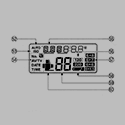Wild EEPROM posted:-Hmm, I see that freenas has an option for advanced power management, are those options worth considering? for example level 127 being intermediate power usage with standby Spindown and spin-up on modern drives causes so much wear and tear that it isn't worth it unless your drives actually spin down consequitively for ~12 hours a day - but a powerlevel of 128-254 is fine, if you can live with the preformance degration. I kinda covered this in an earlier post, but since zfs send (and receive) works with standard streams, you can throw it directly in an image with the following command: code:
|
|
|
|
|

|
| # ? Apr 28, 2024 23:20 |
|
D. Ebdrup posted:Spindown and spin-up on modern drives causes so much wear and tear that it isn't worth it unless your drives actually spin down consequitively for ~12 hours a day Sure about that? Most everything has those head parking ramps now, they're supposed to reduce the wear and tear of start/stop since the heads are never over the platter surfaces until the platters are at full speed. Manufacturers have also raised their lifetime start/stop cycle ratings way up from what they used to be 10-15 years ago.
|
|
|
|
If I recall correctly, modern drives are rated at between 50k and 600k load cycles (with WD Red at 300k, I think). Out of this load cycle count you have factor in firmware-level headparking, os-level headparking, power events, spindown (if enabled) and probably some other factors I'm missing. It's basically impossible to say what you should be using without knowing the model of drive and the disk access frequency (how often the disk is accessed throughout all of the day, including maintainance features and whatever OS features there might be). Additionally, try and calculate how much you're actually going to be saving if you enable spindown. If you can break even with buying replacement(s) to replace the one(s) that'll eventually die because of excessive LLC, I'll be very surprised. BlankSystemDaemon fucked around with this message at 10:48 on Jul 6, 2014 |
|
|
|
|
Speaking of power, im really surprised how little power my NAS uses. Finally got a UPS on it with a power usage meter built in. My 4 drive i3/8gb ram UPS, cable modem, and router only pull 56-61w. UP to around 76w when the drives are all going.
|
|
|
|
Thanks for those numbers. I keep toying with the idea of a NAS, but all it'd do would server a single workstation. Sounds like 50-75W all day combined with partial workstation runtime would probably trump the usage of leaving the workstation running 24/7 solo. A long while ago I measured around 100W idle draw, and that was with a less efficient PSU and a graphics card with high idle draw.
|
|
|
|
Combat Pretzel posted:Thanks for those numbers. I keep toying with the idea of a NAS, but all it'd do would server a single workstation. Sounds like 50-75W all day combined with partial workstation runtime would probably trump the usage of leaving the workstation running 24/7 solo. A long while ago I measured around 100W idle draw, and that was with a less efficient PSU and a graphics card with high idle draw. The nice thing about a nas is i can run downloaders and all kinds of poo poo off it and if my htpc, or laptop or desktop or anything breaks it doenst matter. cause none of my 24/7 stuff relies on the machines i use day to day.
|
|
|
|
I had a 1.5TB drive go bad in my server, and I thought I had a hot spare but I guess not, so time to buy a new one... It looks like 1.5TB aren't really a thing anymore, or at least the few of them that there are are way more expensive than a 2TB Red. So I don't really know what I'm asking, I guess I should just get the WD Red, right? Though when looking, I did find that WD makes Purple drives now, for video surveillance applications.
|
|
|
|
FISHMANPET posted:So I don't really know what I'm asking, I guess I should just get the WD Red, right? FISHMANPET posted:Though when looking, I did find that WD makes Purple drives now, for video surveillance applications.
|
|
|
|
So I finally moved my NAS4Free box off of my ESXi stack (i5-2400, no ECC) and onto its own dedicated box. I snagged this on eBay which seems to be a screaming deal to me for an X3450, 2x 4GB ECC DIMMs, and an X8SI6 motherboard. Piecing it together you'd spend a lot more than that. I got mine last night - it seems to be a board that Supermicro OEM'd for Netgear since the full part number (X8SI6-NI015) doesn't show up anywhere at all other than this auction. It's got the onboard LSI SAS2008 chip with two SFF-8087 connectors like the X8SI6-F, but it lacks the IPMI capabilities. It even came with a 256MB USB stick in it, complete with a 'WARRANTY VOID IF REMOVED' sticker, with ReadyNAS installed on it. Which I wiped and threw NAS4Free on, of course, after reflashing the onboard SAS2008 with IT firmware. I'm still using my m1015 at the moment since the SAS ports on the motherboard are too close to my drives for my regular Monoprice cables. Some 90 degree ones should do the trick, though.
|
|
|
|
Don Lapre posted:The nice thing about a nas is i can run downloaders and all kinds of poo poo off it and if my htpc, or laptop or desktop or anything breaks it doenst matter. cause none of my 24/7 stuff relies on the machines i use day to day.  v (--edit: Basically what he ^^^ seemed to have done.) v (--edit: Basically what he ^^^ seemed to have done.)
|
|
|
|
My Xeon desktop just developed some bad RAM that wouldn't let it boot any OS anymore, and I guess the good thing is that my motherboard halted the system upon seeing an ECC error. But bad hardware happens and that's just reality and something I assume in any hardware I buy or buildand how I operate. I'm kinda sunk if my NAS is out of commission, but at least I've got a spare to keep me going. Most of the benefits of centralized and dedicated storage only matter when you have several endpoints that you want to use and they cycle around all the time (mobile devices in particular). If you watch your movies and do pretty much everything from that one machine and you don't really upgrade or maintain it much, it can work fine. But having a machine I regularly scrub that's separate from all the junk that happens on my desktop helps isolate data I should care about and shouldn't from a physical standpoint as well. In case of fire, I just need to grab a lockbox, my rather portable NAS if possible, and my family members of course.
|
|
|
|
Is it as taxing on the drives to expand an array as it is to rebuild one from a failed drive?
|
|
|
|
eightysixed posted:Is it as taxing on the drives to expand an array as it is to rebuild one from a failed drive? If you mean the things going to be writing for hours and hours and hours yes.
|
|
|
|
It's more or less the exact same process, either you're rebuilding the data of a drive that was there that failed, or you're pretending that there was a drive there and rebuilding the data onto it.
|
|
|
|
So I built a NAS around three years ago and had middling results. Custom built pc running freenas and it's been pretty good, but I'm looking to replace it and just get an appliance instead, that won't take up space under my desk and be easier to swap drives into if/when they fail. I was thinking of getting a diskstation and 4x 4TB drives, probably the WD Reds. It's pretty simple but are there any significant problems with either the Seagate NAS or WD Red drives, or any of the major NAS appliance enclosures? Unsure if there's any gotchas like there are with SSDs.
|
|
|
|
Falcon2001 posted:So I built a NAS around three years ago and had middling results. Custom built pc running freenas and it's been pretty good, but I'm looking to replace it and just get an appliance instead, that won't take up space under my desk and be easier to swap drives into if/when they fail. If you just want a Nas why not get a Microserver? They practically give the N54L away and if you want more horsepower you can get the GEN8 version. I have the older one and it runs Ubuntu like a champ with ZFS as my filesystem. It saturates Gbit Ethernet easily and is rock solid.
|
|
|
|
Mr Shiny Pants posted:If you just want a Nas why not get a Microserver? They practically give the N54L away and if you want more horsepower you can get the GEN8 version. Snap, I've got the N40L with ZFS and Ubuntu and it's been rock solid/fast for 2.5 years. You really don't need much know-how to set it up either - I bundled my way through it with a few guides and a little Linux experience. I did get a bit of a scare this week when I did an apt-get upgrade and my pools disappeared after a reboot, but I just needed to explicitly update the ZFS packages. A few months ago I dipped in here, saw the discussion about xpenology and almost got carried away into formatting the whole thing to set that up, but came to my senses and stuck with stability 
|
|
|
|
Froist posted:Snap, I've got the N40L with ZFS and Ubuntu and it's been rock solid/fast for 2.5 years. Yeah the worst part is adding the ZFS PPA to Ubuntu  After that it's just creating a Zpool and filesystems using the Oracle documentation. After that it's just creating a Zpool and filesystems using the Oracle documentation.
|
|
|
|
My oldest 3 2TB drives (one in particular, about 19 months old) have been giving me issues in my zpool. One dropped out of the pool last night, and I had to reboot and import/export a couple times for it to pick the drive up. Just dropped in an order for 4 4TB Reds, which will replace a single older Red and the 3 Greens in that particular raidz. Once they're all swapped out, guess I'll find out if autoexpand works like it should! This should bump my usable space from ~12TB to ~18TB. I was originally planning to swap with 3TB drives, since they're a little cheaper per GB, but I'm already at 99% pool utilization, so the added 3TB can't hurt. It'll let me put off adding drives or upgrading the other 2TB drives for quite a while. edit: Hopefully the faulted drive makes it until the replacement drives are here. 13223 powered on hours, 515975 load cycle count, and it was throwing the last 5 errors about a minute after power-on last night. The other 2 Greens haven't pitched any errors yet, with 23k and 24k power on hours. They're both over 580k load cycle counts though. PitViper fucked around with this message at 15:44 on Jul 12, 2014 |
|
|
|
Mr Shiny Pants posted:If you just want a Nas why not get a Microserver? They practically give the N54L away and if you want more horsepower you can get the GEN8 version. Hmm. I was considering it. When I set up my NAS way back when ZFS wasn't really working all that well on *nix (from what I heard), so it's all fine and dandy now? Alternately, I thought that ZFS was a bit of a memory hog, is it working fine with the 2GB or whatever that the microserver comes with?
|
|
|
|
PitViper posted:but I'm already at 99% pool utilization, Yeah, one of my pools is the same. I've got no more space in the case and this was one of the first pools I ever set up and I dumbly created it with 10 drives, so it's going to cost a small fortune to upsize all those drives. The problem is that it takes half a month to scrub when utilization is that high. Sometimes I miss WHS and it's ability to expand with any size drive, a drive at a time. ^^ZFS on Linux is fine.
|
|
|
|
Thermopyle posted:Yeah, one of my pools is the same. I've got no more space in the case and this was one of the first pools I ever set up and I dumbly created it with 10 drives, so it's going to cost a small fortune to upsize all those drives. Yea, I've got 8 in mine, but in 2 raidz sets of 4 each. I figured I could easily upgrade 4 at a time, plus it gave a little extra redundancy. And adding another vdev of 4 is somewhat easy without going crazy with a huge case and all that. If I ever need more than 12x4TB, then I think there's a problem with digital hoarding.
|
|
|
|
Froist posted:Snap, I've got the N40L with ZFS and Ubuntu and it's been rock solid/fast for 2.5 years. What would be the reason for choosing Ubuntu over FreeNAS? It's the same thing, except FreeNAS comes with a webUI, and it's completely brainless, whereas Ubuntu you're forced to use the command line the entire time, at least as far as I know. Thoughts?
|
|
|
|
Megaman posted:What would be the reason for choosing Ubuntu over FreeNAS? It's the same thing, except FreeNAS comes with a webUI, and it's completely brainless, whereas Ubuntu you're forced to use the command line the entire time, at least as far as I know. Thoughts? Can't speak for anyone but myself, but I went with Ubuntu so I could run some Virtual Machines on my NAS.
|
|
|
|
Crossbar posted:Can't speak for anyone but myself, but I went with Ubuntu so I could run some Virtual Machines on my NAS. Yeah I guess my question is if there really is a point in not doing FreeNas unless you're using the server for more than one thing. If your storage is important than you should technically have it on a separate server anyway, and it doesn't cost almost anything to have a separate storage server. Maybe like $400.
|
|
|
|
Megaman posted:Yeah I guess my question is if there really is a point in not doing FreeNas unless you're using the server for more than one thing. If your storage is important than you should technically have it on a separate server anyway, and it doesn't cost almost anything to have a separate storage server. Maybe like $400. FreeNAS/NAS4Free are absolutely excellent at what they do (I actually prefer NAS4Free because I think the GUI is a hell of a lot better). If all you want to use it for is a ZFS server, they are absolutely the right choice. If you want to do some limited other things with them, they still can do pretty well--FreeNAS will let you run jails for various BSD-compatible packages, and NAS4Free comes with a couple of useful packages like Transmission pre-installed. It's when you're talking about layering on Plex or Slickbeard or whatever else that some people find it worthwhile to go with ZFS on Linux.
|
|
|
|
Megaman posted:What would be the reason for choosing Ubuntu over FreeNAS? It's the same thing, except FreeNAS comes with a webUI, and it's completely brainless, whereas Ubuntu you're forced to use the command line the entire time, at least as far as I know. Thoughts? Meh, I don't have a good answer. Back then I guess I was in the stage of my life where I thought it was "cooler" to set things up myself. If I was doing it now I'd probably go with something more "managed', but there's no real reason to change things now. Although I guess in theory I could format the OS drive and import the ZFS pool into another setup if I really wanted to.. On a tangibly related subject, I'm now getting the following from zpool status: quote:status: The pool is formatted using a legacy on-disk format. The pool can still be used, but some features are unavailable. I guess there's no real risk to going ahead?
|
|
|
|
Hopefully some of you would find this amusing. I started a project to keep me busy by upgrading some older Core2 machines for shits. One thing that stood out was external IO. This is a Dell Optiplex 960 SFF so it has eSATA natively but eSATA is rare and a chore. I looked into adding USB 3.0 but options are limited because the mainboard only has PCI 32bit expansion (133MB/s paper spec). I found some cheap Startech USB 3.0 PCI cards for $20 direct so I went and bought one and here are the results. C2Q 9650 8GB DDR2 Intel Q45 chipset Windows 8.1 64bit (bonus Windows 8.x has native USB attached SCSI -UAS- support) Here's the IO chain: Samsung EVO 840 500G (should max out PCI 32bit bus) V Seagate 2.5" bus powered SATA > USB 3.0 card (ASM1053 controller) V Startech USB 3.0 PCI card(Renesas D720200AF1 PCIe > Pericom P17C9x PCI 32bit bridge) Sequential R/W speeds are ~100MB/s:73MB/s respectively. A bit shy of the 133MB/s paper spec for 32bit PCI. Still, not bad especially considering this is better than FW800 which would still require an additional card for most systems and USB 3.0 is more ubiquitous now anyway and is backwards compatible with USB 2.0. edit: Also the PCI USB 3.0 card has a 4 pin molex connector for power but with it unplugged the card can still power 2.5" 7200rpm spinning drives so I don't think its necessary to have it plugged in at all since anything requiring more power will most likely have its own power supply anyway. Shaocaholica fucked around with this message at 20:07 on Jul 12, 2014 |
|
|
|
Falcon2001 posted:Hmm. I was considering it. When I set up my NAS way back when ZFS wasn't really working all that well on *nix (from what I heard), so it's all fine and dandy now? ZFS on Linux rocks, ZFS is a memory hog true but memory is cheap. I have my microserver decked out with 16GB ECC Ram. No problem whatsoever. As for why ubuntu instead of Nas4FRee or something: I want a server OS that I can customize the way I want.  I don't do that much with the storage stuff to be honest, you configure it and it runs.
|
|
|
|
Ironically I kind of am looking for more of the brainless part. As someone who's configured linux/etc and ran it as a server for a while, going from basic FreeNAS to 'I want to install an unzipping program on this directly' and navigating FreeBSD was very painful. I don't run much in the way of applications/etc on my NAS, it's just there for storage and maybe a few extras, so having the huge wide openness of *nix isn't really worth it for me. A friend of mine has a diskstation and it seems like pretty much what I want. NAS part works fine with no hassles, the few apps you can install are basically all the ones I need. (audio browser, file browser, etc) Are there distros like FreeNAS/NAs4Free that run on straight linux rather than FreeBSD? Honestly that might be enough, but constantly running into the 'it's just like linux EXCEPT' was really frustrating.
|
|
|
|
Falcon2001 posted:Are there distros like FreeNAS/NAs4Free that run on straight linux rather than FreeBSD? Honestly that might be enough, but constantly running into the 'it's just like linux EXCEPT' was really frustrating. It's not that different. Linux is "just like Linux EXCEPT (it's RPM-based instead of .deb and you have no idea where to find packages, or it's busybox and doesn't have a package manager or bash or any normal utilities, or it's an ancient version of CentOS heavily tweaked and you can't get anything modern, or...)". Especially appliances. FreeNAS, NAS4Free, and Nexenta (which is even further from Linux) are best of breed. You can use OpenFiler if you don't mind something based on CentOS5 which hasn't had a release in years. Or OpenMediaVault, which is newer and maybe ok, but really lacking in plugin support and you'll have to touch the shell a lot. Or use Amahi, but then you're way past just a NAS, since it's fundamentally a home server designed to run a ton of apps.
|
|
|
|
evol262 posted:FreeBSD has a more consistent filesystem and better documentaton than many Linux distros. I guess I haven't looked up Linux documentation in a while, but I found FreeBSD to be frighteningly badly documented. Stuff like the default package manager in the latest release pointing to an empty repo because of an almost year-old security issue instead of the nearly identical one that apparently everyone used anyway, etc. Part of it was also just that FreeNAS itself had big gaps in the documentation that assumed you were already FreeBSD savvy. That's not necessarily a bad thing but it was certainly painful for it to suddenly just drop huge parts of an in-depth tutorial without a link or anything.
|
|
|
|
Falcon2001 posted:Part of it was also just that FreeNAS itself had big gaps in the documentation that assumed you were already FreeBSD savvy. That's not necessarily a bad thing but it was certainly painful for it to suddenly just drop huge parts of an in-depth tutorial without a link or anything.
|
|
|
|
DrDork posted:You may want to look at NAS4Free, then. I found it to both had better documentation, and completely abstract away EVERYTHING FreeBSD related to the point where if you didn't want to tinker much (and you don't need to, usually), you need all of like 6 clicks/button presses to install and get up and running. Might do that if I can find a good deal on a Microserver and plenty of RAM.
|
|
|
|
Falcon2001 posted:I guess I haven't looked up Linux documentation in a while, but I found FreeBSD to be frighteningly badly documented. Stuff like the default package manager in the latest release pointing to an empty repo because of an almost year-old security issue instead of the nearly identical one that apparently everyone used anyway, etc. Yeah, I don't know what obscure Linux distro you'd have to be comparing it to for FreeBSD to be considered well documented, but certainly it wasn't compared to, say, Ubuntu or Debian, in my experience. My first foray into ZFS was actually on FreeBSD, and it was amazingly jarring in how much more effort it took to figure out all the random issues you encounter along the way compared to Ubuntu (which is what I now use for my file server).
|
|
|
|
GokieKS posted:Yeah, I don't know what obscure Linux distro you'd have to be comparing it to for FreeBSD to be considered well documented, but certainly it wasn't compared to, say, Ubuntu or Debian, in my experience. My first foray into ZFS was actually on FreeBSD, and it was amazingly jarring in how much more effort it took to figure out all the random issues you encounter along the way compared to Ubuntu (which is what I now use for my file server). This is the best documentation on ZFS management that I've read
|
|
|
|
Falcon2001 posted:I guess I haven't looked up Linux documentation in a while, but I found FreeBSD to be frighteningly badly documented. Stuff like the default package manager in the latest release pointing to an empty repo because of an almost year-old security issue instead of the nearly identical one that apparently everyone used anyway, etc. GokieKS posted:Yeah, I don't know what obscure Linux distro you'd have to be comparing it to for FreeBSD to be considered well documented, but certainly it wasn't compared to, say, Ubuntu or Debian, in my experience. My first foray into ZFS was actually on FreeBSD, and it was amazingly jarring in how much more effort it took to figure out all the random issues you encounter along the way compared to Ubuntu (which is what I now use for my file server). I'd also say that FreeBSD is amazingly well documented, especially in comparison to Ubuntu and Debian. Debian (and Ubuntu) are atrociously documented, due large in part to Debian's "any init/mta/whatever system you want" a la carte philosophy towards system building. I'm not saying that FreeBSD has better support than Debian or SuSE, or that trying to find help for odd problems is easier. It isn't. The Ubuntu forums, Arch wiki, etc are all much better. But the FreeBSD Handbook is amazing documentation, up there with the RHEL(/CentOS) Deployment Guide, Fedora, etc. I'm a developer for Red Hat, so I'm pretty familiar with their docs. I could have used SuSE's. Other distros are lacking. When I say "documentation", I mean this, or this (Red Hat access portal is down right now), or this for FreeBSD, which says "here's how to do absolutely everything you may need to go on a system or where to find more resources, all in one place". Almost every question you'd every have on FreeBSD should be answered in this handbook, or you can get a pointer for where to go next. PFSense butchers FreeBSD to the point this is all useless. NAS4Free/FreeNAS do not. It's totally applicable. Ubuntu doesn't do this (they're trying, but it's pretty lackluster right now). Debian isn't anywhere close and probably never will be. Same for Arch. Gentoo was ok in the past, but pretty bad now. Again, not forums, serverfault questions, or whatever. Actual documentation. evol262 fucked around with this message at 03:41 on Jul 13, 2014 |
|
|
|
Fair enough then, I guess I'd amend my complaint to 'hard to find answers to questions for' rather than documented well.
|
|
|
|
I'm familiar with his posts and I agree that it's a very useful guide, though I'm not sure why you linked it in response to me - I was talking about when I first started using ZFS with FreeBSD 8, a long time ago, and I was referring to BSD, not ZFS. evol262 posted:I'd also say that FreeBSD is amazingly well documented, especially in comparison to Ubuntu and Debian. Debian (and Ubuntu) are atrociously documented, due large in part to Debian's "any init/mta/whatever system you want" a la carte philosophy towards system building. I'm not saying that FreeBSD has better support than Debian or SuSE, or that trying to find help for odd problems is easier. It isn't. The Ubuntu forums, Arch wiki, etc are all much better. But the FreeBSD Handbook is amazing documentation, up there with the RHEL(/CentOS) Deployment Guide, Fedora, etc. OK, I digress, if you were looking for documentation as an academic exercise, yeah, the handbook is nice. But for "I ran into this issue and I need to know how to fix it", it's definitely easier for a popular Linux distro as you said.
|
|
|
|

|
| # ? Apr 28, 2024 23:20 |
|
GokieKS posted:I'm familiar with his posts and I agree that it's a very useful guide, though I'm not sure why you linked it in response to me - I was talking about when I first started using ZFS with FreeBSD 8, a long time ago, and I was referring to BSD, not ZFS. The whole package management kerfluffle with BSD is a great example. The documentation is almost certainly explicit on how package management works, how to set up a repository, what they are, and exact specs about it. None of that answers the question 'why does my main repo contain zero packages'. Either way I'm not like anti-BSD or anything and I certainly recognize that systems like applicances have huge problems if you try to exceed their functionality compared to a full BSD install, but my goal is to just not have to learn a new OS to setup basic functionality on my NAS. I'll check out NAS4Free and see how it goes - might boot it on my laptop or something to test out the UI.
|
|
|























